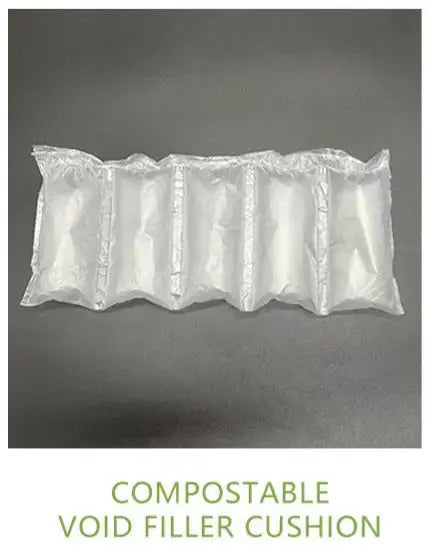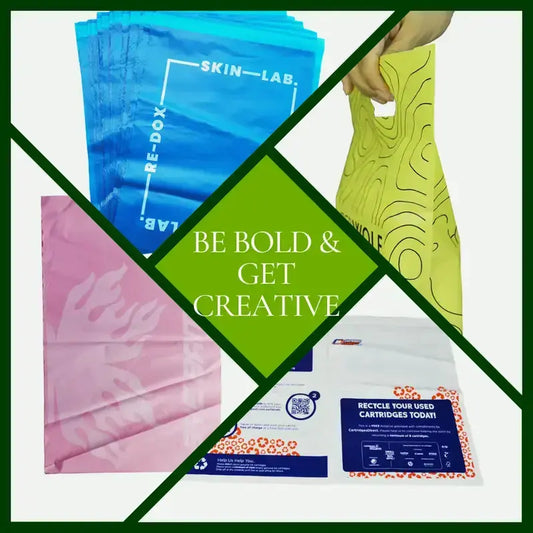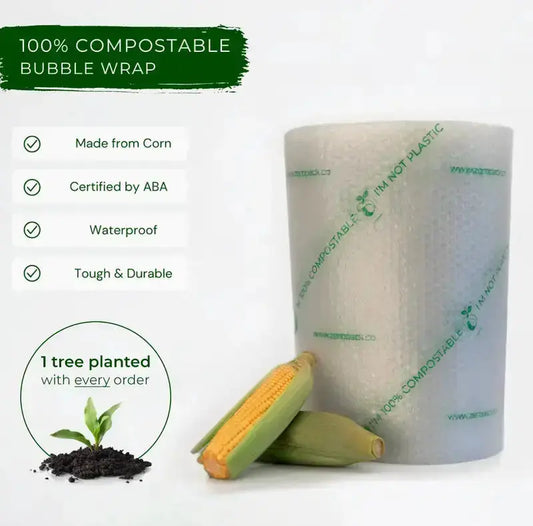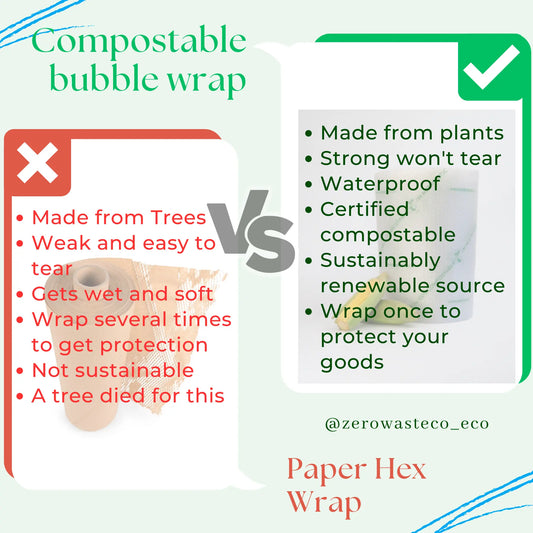The Future of Sustainable Packaging: Exploring the Benefits of Compostable Mailers
In today's environmentally conscious world, sustainable packaging has become a top priority. As consumers become more aware of the impact of traditional packaging materials on the planet, they are actively seeking alternatives that are eco-friendly and easily biodegradable. One such solution gaining popularity is compostable mailers. In this article, we will explore the future of sustainable packaging and delve into the numerous benefits of using compostable mailers.
Compostable mailers are made from plant-based materials such as cornstarch or sugarcane, which are renewable resources. Unlike traditional packaging materials like plastic or polythene, compostable mailers are designed to break down naturally without leaving any harmful residues behind. This not only helps reduce the amount of waste going to landfills but also contributes to a healthier environment.
The benefits of compostable mailers go beyond their biodegradability. They are lightweight, making them more cost-effective to ship, and their durability ensures that products are protected during transit. Additionally, compostable mailers can be custom printed, providing businesses with an opportunity to showcase their commitment to sustainability and enhance their brand value.
Join us as we explore the future of sustainable packaging and unlock the potential of compostable mailers in reducing our carbon footprint and creating a greener world.
The environmental impact of traditional packaging
The world is facing a growing crisis when it comes to the environmental impact of traditional packaging materials. Plastic, in particular, has become a major concern, with millions of tons of plastic waste ending up in our oceans, landfills, and natural habitats every year. This plastic pollution not only harms marine life but also has far-reaching consequences for the entire ecosystem.
The production of traditional packaging materials, such as plastic, also contributes significantly to greenhouse gas emissions and the depletion of natural resources. The extraction, refining, and manufacturing processes involved in creating these materials are energy-intensive and often rely on non-renewable fossil fuels. This, in turn, leads to increased carbon emissions and a larger carbon footprint, further exacerbating the global climate crisis.
Consumers are becoming increasingly aware of these environmental issues and are demanding more sustainable packaging solutions. As a result, businesses are under growing pressure to find alternatives that are eco-friendly, biodegradable, and minimally impact the planet. This shift in consumer behavior and corporate responsibility has paved the way for the rise of compostable mailers as a promising solution to the packaging problem.
What are compostable mailers?
Compostable mailers are a type of packaging material that is designed to break down naturally and safely in a composting environment. These mailers are typically made from plant-based materials, such as cornstarch, sugarcane, or other renewable resources, rather than traditional petroleum-based plastics.
The key difference between compostable mailers and traditional packaging materials is their ability to decompose without leaving behind harmful residues or microplastics. When composted, compostable mailers break down into carbon dioxide, water, and nutrient-rich organic matter, which can then be used to enrich soil and support plant growth. This closed-loop process helps to reduce waste, conserve natural resources, and create a more sustainable ecosystem.
Compostable mailers are not only environmentally friendly but also versatile. They can be used to ship a wide range of products, from clothing and accessories to small electronics and fragile items. Additionally, these mailers can be customized with printed designs, allowing businesses to showcase their commitment to sustainability and enhance their brand image.
Advantages of compostable mailers
One of the primary advantages of compostable mailers is their ability to reduce waste and minimize the environmental impact of packaging. Unlike traditional plastic or polythene mailers, which can take hundreds of years to decompose, compostable mailers can break down in a matter of months when placed in a proper composting environment. This helps to divert waste from landfills and reduce the strain on our already overburdened waste management systems.
Another key benefit of compostable mailers is their contribution to a more circular economy. By using renewable and biodegradable materials, these mailers can be reintegrated into the natural ecosystem, providing valuable nutrients for soil and supporting the growth of new plant life. This closed-loop system helps to conserve natural resources, reduce greenhouse gas emissions, and create a more sustainable future.
Compostable mailers also offer practical advantages for businesses and consumers. They are typically lighter in weight compared to traditional packaging materials, which can lead to reduced shipping costs and a lower carbon footprint associated with transportation. Additionally, the durability of compostable mailers ensures that products are protected during transit, minimizing the risk of damage and returns.
Compostable mailers vs. traditional packaging materials
When comparing compostable mailers to traditional packaging materials, the key differences lie in their environmental impact, sustainability, and overall performance.
Plastic and polythene mailers, while relatively inexpensive and widely used, have a devastating impact on the environment. These materials are non-biodegradable and can take centuries to decompose, often ending up in landfills, oceans, and natural habitats, where they harm wildlife and disrupt ecosystems. In contrast, compostable mailers are designed to break down safely and naturally, leaving behind no harmful residues.
Another significant difference is the carbon footprint associated with each type of packaging. The production of traditional plastic and polythene materials is energy-intensive and relies heavily on non-renewable fossil fuels, contributing to increased greenhouse gas emissions. Compostable mailers, on the other hand, are made from renewable plant-based materials, which have a much lower carbon impact and can be reintegrated into the natural cycle through composting.
How to choose the right compostable mailer for your business
When selecting the right compostable mailer for your business, there are several factors to consider to ensure that you make the best choice for your needs and the environment.
First and foremost, it's essential to ensure that the compostable mailer you choose is certified Home and/or Industrial Compostable by the Australasian Bioplastics Association (AS5810/AS4736 respectively). These certifications provide assurance that the mailer meets strict standards for biodegradability, compostability, and environmental safety.
Next, consider the specific requirements of your products and the shipping conditions they will face. Compostable mailers come in a variety of sizes, shapes, and designs, so it's important to choose a mailer that can adequately protect your items during transit while still maintaining its compostable properties. Additionally, think about the branding and customization options available, as this can help you showcase your commitment to sustainability and enhance your brand's image.
Case studies: Companies using compostable mailers successfully
As the demand for sustainable packaging solutions grows, more and more companies are embracing the use of compostable mailers. Here are a few examples of businesses that have successfully implemented compostable mailers and reaped the benefits:
- Patagonia: The outdoor apparel company Patagonia has been a pioneer in the use of compostable mailers. They have partnered with leading manufacturers to develop custom-designed mailers made from renewable, plant-based materials that can be easily composted by their customers.
- Pela Case: Pela Case, a manufacturer of eco-friendly phone cases, has made compostable mailers a central part of their sustainable packaging strategy. They use mailers made from corn-based bioplastic, which can be composted at home or in industrial facilities.
- The Honest Company: The Honest Company, a brand known for its commitment to sustainability, has also embraced compostable mailers for its products. Their mailers are made from renewable materials and are designed to break down safely in a composting environment.
These companies have not only reduced their environmental impact through the use of compostable mailers but have also seen positive results in terms of customer engagement and brand loyalty. By showcasing their dedication to sustainability, they have been able to differentiate themselves in the market and appeal to conscious consumers.
The future of sustainable packaging and the role of compostable mailers
As the world becomes increasingly aware of the environmental consequences of traditional packaging materials, the future of sustainable packaging looks brighter than ever. Compostable mailers are poised to play a crucial role in this transition, offering a viable and eco-friendly alternative to the plastic-based packaging that has dominated the market for decades.
Advances in materials science and manufacturing processes are paving the way for even more innovative and effective compostable packaging solutions. Researchers are exploring new plant-based materials, such as seaweed, bamboo, and agricultural waste, to create mailers that are not only biodegradable but also have improved durability and performance characteristics.
At the same time, there is a growing push for the development of comprehensive composting infrastructure, both at the industrial and community levels. As more cities and municipalities invest in the necessary facilities and education campaigns, the accessibility and adoption of compostable mailers will continue to increase, making it easier for consumers to dispose of them responsibly.
Conclusion: Embracing the shift towards sustainable packaging
The future of sustainable packaging is here, and compostable mailers are at the forefront of this exciting shift. By embracing the use of these eco-friendly alternatives, businesses and consumers alike can play a vital role in reducing waste, conserving natural resources, and creating a healthier, more sustainable planet.
As we've explored in this article, the benefits of compostable mailers are numerous, from their ability to break down naturally to their potential to contribute to a more circular economy. While there are still some challenges to overcome, the momentum behind sustainable packaging solutions is undeniable, and the opportunities for innovation and progress are vast.
By choosing compostable mailers, businesses can not only reduce their environmental impact but also enhance their brand image and appeal to the growing number of conscious consumers who are demanding more sustainable options. And for consumers, the decision to opt for compostable packaging is a simple yet impactful way to contribute to a greener future.

















0 comments